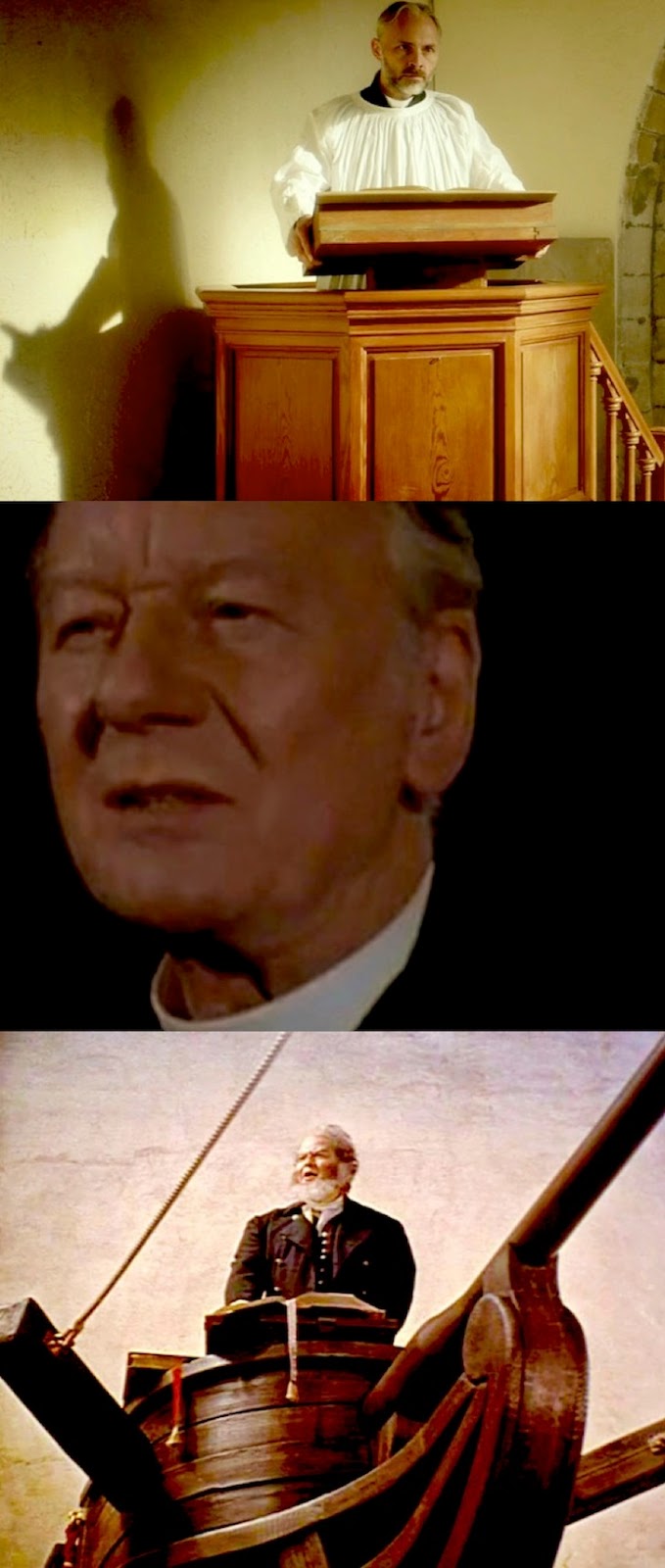 |
| Joan Fontaine, Laurence Olivier, Judith Anderson in creepy crawly Hitchcock/Selznick romance. |
Rebecca (1940)
Dir. Alfred Hitchcock
Prd. David O. Selznick
Nvl. Daphne du Maurier
Scr. Robert E. Sherwood, Joan Harrison
Starring: Laurence Olivier, Joan Fontaine, Judith Anderson,
George Sanders, Gladys Cooper, Nigel Bruce
Review By Greg Klymkiw
"She was incapable of love or tenderness or decency." - Maxim de Winter (Laurence Olivier) in Alfred Hitchcock's Rebecca
Rebecca is a creepy-crawly romance. Make no mistake, though - it is indeed a romance, but damn (!), the picture makes your flesh squirm and the cherry on the sundae is that it's often so suspenseful that you occasionally feel like being one big screaming-sissy-pants-baby.
There aren't many American feature films as great as this one - it's in a class all its own. The finished product is the result of easily the most combustible producer-director partnerships in movie history. Auteur American producer David O. Selznick (Gone With The Wind) teamed up with auteur British director Alfred Hitchcock to adapt the wildly best-selling gothic romance novel by Daphne du Maurier and in so doing, yielded a film that was as modern and sophisticated for its period that has also stood the test of time - so well, that it's still more dazzlingly original than most films made these days, or for that matter - ever!
Hitchcock, however, seemed to downplay the worth of Rebecca, going so far as to say that "it's not really a Hitchcock film", but rather David O. Selznick's picture. Hitch couldn't have been more wrong, though. The movie is pure Hitchcock. He just didn't realize it.
The story that unfurls is one of obsession and on the surface, pure gothic romance. When the ultra-rich widower Max de Winter (Laurence Olivier) meets a plain, nameless (yes, nameless!) travelling companion (Joan Fontaine) at a Mediterranean seaside resort, he falls madly in love with her and whisks the young woman off to be his wife and preside over his mansion Manderley. Of course, the rambling old estate is haunted - mostly by the lingering memories (and perhaps even the ghost) of de Winter's dead first wife Rebecca.
Once ensconced in the stately manse, Max is often busy with business matters and it's up to his fresh new wife to take up her duties as "lady of the house". This is easier said than done. The house is still adorned with all the touches bestowed upon it by the late Rebecca (who died tragically in a boating accident on the raging seas that the mansion overlooks). Even her bedroom, with all its clothing and accoutrements has been preserved as she left it the night she died.
The creepy old housekeeper Mrs. Danvers (the chillingly dour Judith Anderson) does everything she can to remind the young woman what a pale shade she is to the deceased former lady of the house. The new bride assumes Max wants her to replace Rebecca, but in actuality, the title character, as we are reminded constantly, can never really be replaced. If the young bride is to keep both her sanity and her new husband, she needs to create herself in her own image, not that of a dead woman.
As the film progresses, more and more hints are dropped that things, as they so often are in life, are never what they seem. Madness, infidelity and, perhaps, murder most foul lurk in ever dark corner and the picture stealthily makes its way to a climax that is as nail-bitingly suspenseful as it is wildly and gloriously romantic.
This was indeed a great producer-director collaboration. Many of Selznick's instincts about the material were right and he insisted upon fidelity to the original writing of Daphne Du Maurier - something Hitchcock had a clear distaste for, but ultimately acquiesced to. Good thing. What this resulted in was not only a great picture, but whether Hitchcock could ever admit it or not, Rebecca proved to be an important transition picture in his development as a filmmaker and led the way to his rich period during the 50s and eventually gave way to the other great and perfect tale of obsession, Vertigo. I'd go so far as to suggest that without Selznick, Vertigo might have never eventually happened, or at least not as successfully.
Selznick was a filmmaker. A real filmmaker. So too was Hitchcock. The combination was explosive, but yielded a work of lasting value.
Rebecca is available on a new Criterion Collection Blu-Ray/DVD and easily one of the greatest home entertainment triumphs in years. This stunning new 4K digital restoration of the Hitchcock/Selznick classic features an audio commentary from 1990 featuring film scholar Leonard J. Leff, an isolated music and effects track, a new conversation between film critic and author Molly Haskell and scholar Patricia White, a new interview with film historian Craig Barron on Rebecca’s visual effects, Daphne du Maurier: In the Footsteps of “Rebecca,” an extraordinary 2016 French television documentary, a making-of documentary from 2007, footage of screen, hair, makeup, and costume tests for actors Joan Fontaine, Anne Baxter, Vivien Leigh, Margaret Sullavan and Loretta Young, a casting gallery with notes by director Alfred Hitchcock and producer David O. Selznick, Hitchcock interviewed by Tom Snyder on a 1973 episode of NBC’s Tomorrow, a Tomorrow interview with Fontaine from 1980, audio interviews from 1986 with actor Judith Anderson and Fontaine, three radio versions of Rebecca, from 1938, 1941, and 1950, including Orson Welles’s adaptation of the novel for the Mercury Theatre, the theatrical rerelease trailer, an essay by critic and Selznick biographer David Thomson and selected Selznick production correspondence, including with Hitchcock and on the box, a gorgeous cover painting by Robert Hunt.

























